* You are viewing Posts Tagged ‘Databases’
James Brown
November 26, 2012
Conferences and Workshops, Events, Project Updates, Projects and Centres, Videos, Websites and Databases
Tags: AHRC, Databases, Digitization, Union Catalogue, Visualization
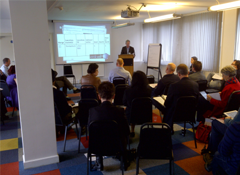
Howard mid-‘yack’
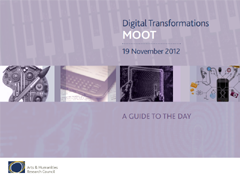
Visit event website
An outing to London last Monday when we presented Early Modern Letters Online at the Digital Transformations Moot, curated and funded by the AHRC. The day long event brought together digital humanists with thinkers and practitioners from other disciplines and sectors ‘to explore the possibilities of the Digital Transformations theme for new and exciting ways of working: to hack, to make, to break’.
The Moot did a great job of showcasing the very wide range of work (and attendant debates) currently being done at the intersection of the humanities and the technical, and in particular in highlighting and fostering new kinds of connections between digital technologies, arts and the humanities, and the creative and cultural industries (the latter being much more strongly represented than is usual at DH gatherings). It was also really interesting from the perspective of event design. Decked out in bracing, challenging terminology – debates were ‘moots’; delegates were ‘mootlings’; papers became ‘yacks’ – the day spread keynote lectures, panel discussions, software demos, and PechaKucha-style talks across multiple tracks and spaces in a kind of freeform digital smörgåsbord that rewarded curiosity and encouraged the creation of individual narratives and serendipitous connections between the sampled components. Further details on the Moot webpage, while the Twitter hashtag was #digitrans; videos of the various live streams will be posted the the webpage shortly.
James Brown
August 29, 2012
Projects and Centres, Websites and Databases
Tags: CKCC, Databases, Digitization, Dutch Republic, History of Scholarship, History of Science, Networks, Seventeenth Century, Visualization
Our good friends and colleagues from Circulation of Knowledge and Learned Practices in the Seventeenth-Century Dutch Republic (CKCC) at Huygens ING in The Hague have a shiny new website. Most excitingly, the revamped site contains a link and extensive supporting documentation for a closed beta (or prototype) of the much-anticipated Epistolarium, a virtual research environment in which users can explore and analyze metadata and full texts of c.20,000 scholarly Dutch letters from the period 1594-1707; see the video above for a rapid-fire introduction. As a long-standing collaborator of CKCC, we’ve been fortunate enough to get a sneak preview of this exciting new resource and will be providing feedback in advance of a full public release (and a resulting edited collection) in 2013. Congratulations to Charles, Guido, Walter, Wijnand, and the rest of the CKCC team!
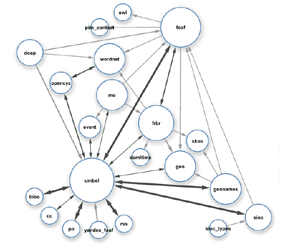 Following on from our participation in a Wikimedia-sponsored data workshop back in April, our technical director Neil Jefferies has published an excellent opinion piece on Representing Knowledge: Metadata, Data, and Linked Data in the latest issue of The Signpost, the community-edited newspaper covering Wikipedia and the Wikimedia Foundation. Neil draws on his extensive experience of knowledge management in both the commercial and academic library sectors to make a convincing case for flexible and non-prescriptive data models. Go read it!
Following on from our participation in a Wikimedia-sponsored data workshop back in April, our technical director Neil Jefferies has published an excellent opinion piece on Representing Knowledge: Metadata, Data, and Linked Data in the latest issue of The Signpost, the community-edited newspaper covering Wikipedia and the Wikimedia Foundation. Neil draws on his extensive experience of knowledge management in both the commercial and academic library sectors to make a convincing case for flexible and non-prescriptive data models. Go read it!
James Brown
May 22, 2012
Conferences and Workshops, Events, Project Updates, Projects and Centres
Tags: CKCC, Databases, IMPAcT, ImpulsBauhaus, Mapping the Republic of Letters, Networks, Prosopography, The French Book Trade in Enlightenment Europe, Union Catalogue, Union Catalogue News, Visualization, Wikipedia
While Anna Marie was weaving animal magic at the Royal Society, our Technical Director Neil Jefferies and I were headed to the Forzhungszentrum Gotha of the University of Erfurt for an invited workshop on ‘Visualizing Data Resources: The Potential of a Wikimedia Platform for the Digital Humanities’ (27–28 April 2012). Expertly organised by Martin Mulsow, Olaf Simons, and Kristina Petri, and generously funded by Wikimedia Deutschland – the largest and most active of the national chapters – the workshop provided an inspiring forum for a wide range of international participants and projects to share approaches and converge on the question of Wikipedia, the digital humanities, visualizations, and many points in between (see the full description [pdf]).
One set of presentations showcased the Wikimedia community’s own plans for data capture and computational seeing, many of which have great potential for the digital humanities; not always a straightforward relationship, as Olaf discussed in his opening address. These include Wikidata (a collaboratively curated, centralised database of entities designed to support the 280+ language editions of Wikipedia, as well as third-party initiatives, currently under development), and Semantic Mediawiki, an open source extension to Wikipedia capable of (re)organizing the site’s existing content into highly configurable, collectively editable semantic databases. The accumulation and management of structured, actionable (wiki)data within these streamlined platforms will facilitate the creation and deployment of information visualizations across the site’s many interfaces, and by its millions of users in the context of exports and mash-ups.
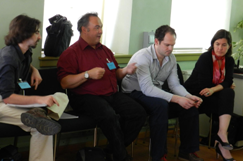
Scott Weingart (Indiana/CKCC), Neil (CofK/Oxford), James (CofK/Oxford), and Nicole Coleman (MRofL/Stanford).
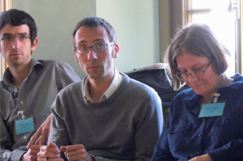
Andreas Wolter (ImpulsBauhaus), Jens Weber (ImpulsBauhaus), and Judith Pfeiffer (IMPAcT/Oxford).
A second cluster of talks focused on the data capture, curation, and visualization techniques and applications being pursued and developed by humanistic projects based in archives, libraries, and universities worldwide. As well as presentations from ourselves and good friends Mapping the Republic of Letters, The French Book Trade in Enlightenment Europe, CKCC, IMPAcT, and Scott Weingart, we heard about (inter alia) linked data and gamification at the University of Colorado; an adaptive, interactive, dynamic historical atlas (AIDA) being created at the University of Erfurt; and the wonderful ImpulsBauhaus initiative based at the the Bauhaus-Universität Weimar. Designed to collect information on and represent the global social networks of the Bauhaus, and led by the designer-developer team Jens Weber and Andreas Wolter in 2009, the project harvested extensive biographical and prospopgraphical data on the movement’s participants and affiliates within a specially designed platform which served as the basis for dynamic network infographics and an interactive three-dimensional table, presented most memorably within an illuminated cube. A video of this extraordinary project opens the post.
Kim McLean-Fiander
May 02, 2012
Conferences and Workshops, Events, Project Updates
Tags: Databases, Gender, Hans Sloane, History of Science, Networks, Union Catalogue, Union Catalogue News, Women
I’ve recently returned from the Situating Early Modern Science Networks workshop at the University of Saskatchewan in a chilly but sunny Saskatoon. Hosted by Dr Lisa Smith (who we met when she gave an excellent paper on Hans Sloane’s correspondence in our 2011 seminar series), the two-day event (12-13 April) saw scholars from the UK, Canada and the US – generously funded by the conference – speak about early modern networks from a wide range of disciplinary perspectives, including English, History, and the History of Science.
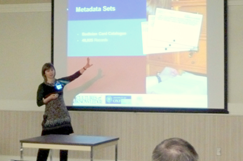
Introducing the catalogue.
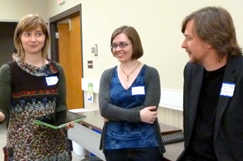
Post-presentation discussion.
My paper ‘Digitizing Gender: Women’s Correspondence and Knowledge Networks in the Early Modern Era’ focused on the ideological and technical challenges of digitizing gender, including the so-called ‘digital gender ghetto’ wherein data on early modern women is only collected and made accessible within gender-specific online silos. Such resources, while valuable, raise methodological and conceptual difficulties; not only does the information they contain often get bypassed by large portions of the scholarly community, but the long-standing trope that early modern women occupied a hermetically sealed separate sphere is implicitly reinforced, sustaining unhelpful assumptions that they were not fully engaged in intellectual or public life. To overcome this predicament, I suggested that we need to develop digital systems which can link or speak to each other so that data on men and women can be interrogated simultaneously. By doing this, the role played in early modern knowledge communities by individuals such as Katherine Jones, Lady Ranelagh, or Dorothy Moore Dury, for example, can be properly assessed and appreciated within a wider network of both male and female individuals and correspondents.
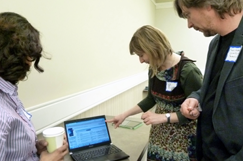
The ‘Digital Coffee House’.
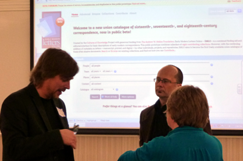
EMLO on the big screen.
The potential for online resources to facilitate and manifest these kinds of connections became clear during the hands-on ‘Digital Coffeehouse’ portion of the workshop, during which participants were introduced to the following array of early modern digital resources: The Digital Ark, The Newton Project, The Sloane Printed Books Project, The Grub Street Project, The Textual Communities Project, Digital MappaeMundi, and our own Early Modern Letters Online. Future digital collaborations may well result! The conference was rounded out with a thought-provoking talk by Professor Robert Iliffe on the implications for scholarly work arising from the increasing digitization of the academic infrastructure. His presentation sparked a lively debate during the roundtable discussion on the future of online scholarship which covered how the UK’s REF (Research Excellence Framework) assessments handle digital humanities outputs; the ownership of digital materials; concerns about scholars losing old skills and values in favour of new ones; and a consideration of the perils and benefits of crowdsourcing.
As part of their recent strategic alliance with Queen Mary, University of London, the Centre for the Study of the Renaissance at the University of Warwick has announced two Postdoctoral Research Fellowships, one based at Queen Mary and one at Warwick, on the theme of ‘Networks and Information Technologies, 1300-1800’. To form part of the collaborative project ‘Rewiring the Renaissance: Cultural Networks and Information Technologies’, the Fellows will explore modes of communication and networking in the Renaissance period, from letter writing to orality, and develop IT-led modern mechanisms which can capture and analyse the Renaissance communities that were constructed. Projects that explore cultural transmission in any media or European language are welcome; in addition, the Queen Mary Postdoctoral Research Fellow will be expected to have the skills that will allow for an interrogation of the ways in which we communicate historical information in a digital world.
The deadline for applications is Friday, 11 May 2012. For background information on the collaboration, further details about the two posts, and to apply, please visit the project webpage. Please send informal enquiries to Dr Penny Roberts.



 Following on from our participation in a Wikimedia-sponsored data workshop
Following on from our participation in a Wikimedia-sponsored data workshop 






 Join
Join 